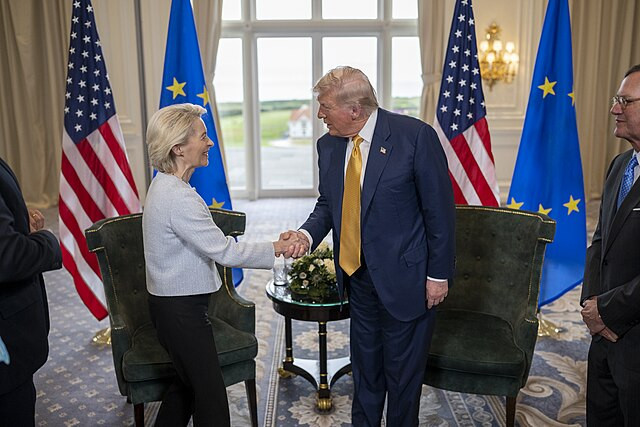President Donald Trump has asked European officials to levy tariffs of up to 100% on imports from China and India, an escalation designed to squeeze Russian President Vladimir Putin by targeting two of Moscow's largest oil customers, according to U.S. and European officials familiar with the discussions.
The request was conveyed during a conference call with EU sanctions envoy David O'Sullivan and other senior European officials visiting Washington this week. A U.S. official and an EU diplomat confirmed the appeal, first reported by the Financial Times, saying the Biden administration is prepared to "mirror" any European tariffs imposed on Beijing and New Delhi. "They are basically saying: We'll do this but you need to do it with us," the diplomat said.
Trump has already raised tariffs on India by 25 percentage points this summer, bringing total duties on certain goods to 50%. He has repeatedly threatened broader measures against both India and China, accusing them of financing Putin's war through record purchases of discounted Russian crude. Data from India's embassy in Moscow showed bilateral trade between India and Russia hit $68.7 billion in the year ending March 2025, nearly six times higher than before the pandemic.
China, the largest buyer of Russian oil, has thus far avoided the steepest "secondary" tariffs after negotiating a truce that reduced new U.S. levies on Chinese products to 30%. At a regular briefing Wednesday, China's foreign ministry said it "firmly opposes" U.S. attempts to apply economic pressure and criticized Washington for "using China in discussions on Russia."
European leaders have so far preferred sanctions to tariffs, seeking to isolate Moscow by restricting its financial system and energy exports. EU bilateral trade with Russia totaled €67.5 billion ($78.1 billion) in 2024, while services trade reached €17.2 billion in 2023, according to European Commission data. The bloc says it remains committed to phasing out Russian fossil fuels but has resisted adopting sweeping tariffs.
Trump's proposal comes as his administration struggles to make headway on peace talks. His summit with Putin in Alaska last month yielded few concrete results. "There were many, many points that we agreed on ... I would say a couple of big ones that we haven't quite got there, but we've made some headway," Trump said afterward. Putin countered that "root causes" of the conflict must be addressed before any lasting deal can be reached.
Meanwhile, Putin has deepened ties with Chinese President Xi Jinping and Indian Prime Minister Narendra Modi, who met with him at the Shanghai Cooperation Organization summit in Beijing last week. Those relationships complicate Washington's efforts to isolate Russia economically.






